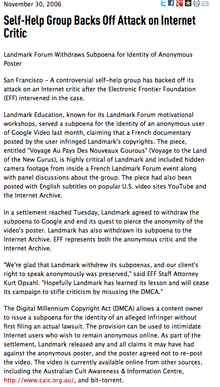Self-Help Group Backs Off Attack on Internet Critic
Self-Help Group Backs Off Attack on Internet Critic
[edit]
November 30, 2006
Self-Help Group Backs Off Attack on Internet Critic
Landmark Forum Withdraws Subpoena for Identity of Anonymous Poster
San Francisco - A controversial self-help group has backed off its attack on an Internet critic after the Electronic Frontier Foundation (EFF) intervened in the case.
Landmark Education, known for its Landmark Forum motivational workshops, served a subpoena for the identity of an anonymous user of Google Video last month, claiming that a French documentary posted by the user infringed Landmark's copyrights. The piece, entitled "Voyage Au Pays Des Nouveaux Gourous" (Voyage to the Land of the New Gurus), is highly critical of Landmark and included hidden camera footage from inside a French Landmark Forum event along with panel discussions about the group. The piece had also been posted with English subtitles on popular U.S. video sites YouTube and the Internet Archive.
In a settlement reached Tuesday, Landmark agreed to withdraw the subpoena to Google and end its quest to pierce the anonymity of the video's poster. Landmark has also withdrawn its subpoena to the Internet Archive. EFF represents both the anonymous critic and the Internet Archive.
"We're glad that Landmark withdrew its subpoenas, and our client's right to speak anonymously was preserved," said EFF Staff Attorney Kurt Opsahl. "Hopefully Landmark has learned its lesson and will cease its campaign to stifle criticism by misusing the DMCA."
The Digital Millennium Copyright Act (DMCA) allows a content owner to issue a subpoena for the identity of an alleged infringer without first filing an actual lawsuit. The provision can be used to intimidate Internet users who wish to remain anonymous online. As part of the settlement, Landmark released any and all claims it may have had against the anonymous poster, and the poster agreed not to re-post the video. The video is currently available online from other sources, including the Australian Cult Awareness & Information Centre, http://www.caic.org.au/, and bit-torrent.
"Landmark's legal threats took an emotional toll," said the anonymous poster, known as "John Doe" in the settlement. "When I found out that my identity might be revealed based on a bogus copyright claim, I was really worried that Landmark might try to retaliate against me."
The settlement is part of EFF's ongoing campaign to protect the right of anonymous speakers on the Internet. Earlier this year, EFF helped to preserve the anonymity of online embroidery fans critical of an industry group, and also protected the identities of users of an online message board discussing Oklahoma public schools.
![]()
This work is released under the Creative Commons Attribution-ShareAlike 3.0 Unported license, which allows free use, distribution, and creation of derivatives, so long as the license is unchanged and clearly noted, and the original author is attributed.
Public domainPublic domainfalsefalse
Works by the Electronic Frontier Foundation are licensed under the Creative Commons Attribution-ShareAlike 3.0 Unported license, per EFF's Copyright Policy.
